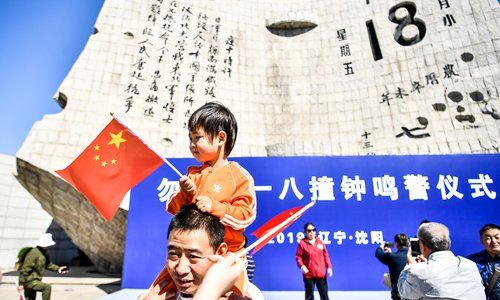HK history exam hints Japanese invasion ‘good,’ slammed for cultivating ‘traitors of China’

Visitors holding Chinese national flags have their photos taken in front of the 9.18 Historical Museum in Shenyang, Northeast China's Liaoning Province on Wednesday. Air raid sirens once again sounded through the city at 9:18 am on Wednesday. The "September 18 Incident" in 1931 was followed by Japan's full-scale invasion of China, triggering the 14-year-long war against Japanese aggression. Photo: IC
Education workers and experts criticized an improper question in Hong Kong college entrance exam on Thursday that ask examinees whether they agree Japan's invasion in China in 1900-45 did more good than harm to China.
They said such question is like asking Western students whether they think Hitler did more good than harm to Europe.
The question is on the history test paper of Hong Kong Diploma of Secondary Education Examination (DSE) that took place on Thursday morning.
Two materials were provided in the question: one is about an agreement between Japanese government and the government of the Qing Dynasty (1644-1911) in 1905 to allow the latter to send students to Japan to study law; the other offered quotes from a then revolutionist's letter to a Japanese politician and a contract between the government of the then Republic of China and a Japanese bank to borrow money.
"The question and these materials apparently take sides with Japan," Chan Wai-keung, a teacher from the Hong Kong Polytechnic University, told the Global Times on Thursday.
He said that these materials are only about some individual cases between 1905 and 1912 but did not breathe a word about Japan's full aggression against China during the period, which is not only violating academic standards but seriously misguides the students.
The Hong Kong Education Bureau slammed the biased question on Thursday night and urged the Hong Kong Examinations and Assessment Authority (HKEAA) to follow up and rectify. The bureau said that the question seriously hurt the feelings and dignity of people who suffered greatly during Japan's aggression.
Deputy-director of the Hong Kong Federation of Education Workers Nicholas Muk also criticized the question as it is extremely biased. "If the question intends to guide the students to answer with agreement, it is actually guiding the students to become hanjian (traitors to China)."
A scholar of the History School of Beijing-based Renmin University of China told the Global Times on Wednesday that the question setter intentionally intercepted and displayed a part of historical materials that favors the Japanese side from the long scroll of history, and meticulously choreographed the materials to misguide students.
As students don't have much access to historical materials, it will leave them the impression that "the Japanese did bring China great benefit" after students read these materials.
History teaching should take the overall background into consideration in handling a specific historical event, instead of intercepting the individual event, let alone independently interpreting materials in a certain standpoint, which is dangerous, experts say.
On the day before the examination, multiple Hong Kong media reported the absurd remark that "without invasion of the Japanese troops, there wouldn't be the 'new China,'" which was suspected made by Hans Yeung on social media. Yeung works as a History Subject Officer of the HKEAA.
Hong Kong news website OrangeNews.hk said that the social media account likely owned by Yeung contains many posts that express hatred to the Chinese mainland and violate the Basic Law.
In regard with Yeung's remark, Hong Kong Federation of Education Workers released a statement, saying that examination works as a baton that has great influence on teachers and students. It raised concerns on whether the integrity and neutrality of DSE is affected because of Yeung's remark as Yeung shoulders the huge responsibility of setting examination questions for DSE.
Chan said that the question itself has indicated that the HKEAA is not rational in choosing questions. As people who made the question have showed an apparent biased stance, their marking criterion could also favor examinees who answered that they agreed that Japanese invaders did more good, which is unfair and would encounter complaints from students.
Chan said that such view of "Japan did more good than harm to China" never appeared in mainstream of the field of history but was only mentioned recently by some pro-Taiwan independence forces.
It is very possible that some Hongkongers start to publicly put forward such view under the impact of people who support "Taiwan independence," which surely deserves vigilance, Chan noted.
